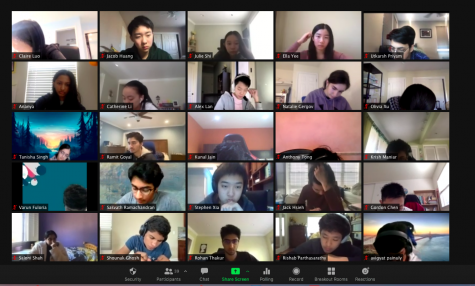STEM Spotlight: Math Club
“STEM Spotlight” is a new Aquila repeater showcasing STEM clubs and their initiatives.
January 22, 2021
STEM Spotlight is a new repeater exploring what clubs at Harker have been doing during remote learning. This week’s featured club is the Math Club, which encourages out-of-the-box problem solving and thinking in various mathematics concepts outside the scope of a typical curriculum.
Led by club adviser Dr. Anu Aiyer since 2015, the club has held various lectures and math contests ranging from shorter online competitions to longer travel competitions such as the Princeton University Mathematics Competition (PUMaC) in the past. The club also offers the B exam of the American Mathematics Competitions (AMC), a 25-question, 75-minute, multiple-choice test that promotes problem-solving skills, to active club members.
Although the team is unable to travel to extended events this year, the club has continued smaller contests, such as the California Math League Competition (CAML), a six-question, 30-minute monthly contest and has provided a weekly challenge problem ranging from proofs to various geometry questions for the club’s members.
“There’s less interaction within the members in the club, but I feel like we’ve kept it pretty consistent in the activities we offer,” Utkarsh Priyam (12), co-president of the club, said. “Online learning has given us more opportunities to provide lecture options and allow more people to take contests because tournaments are taking more participants as well.”
In the first semester, the club also held AreteLabs, a weekly competition of seven to eight questions held in a March Madness-style bracket against other high school math clubs across the country. The team made it to the finals but suffered a loss by just one point.
“In the middle school, we didn’t have as many opportunities, but here in the Math Club at the high school, there’s so many different opportunities hearing from other people’s lectures and seeing different types of contests and questions,” Daniel Lin (9), member of Math Club, said.
The club has adapted to the virtual format smoothly and has seen more participation as a result.
“The officers have done a great job keeping the interest of having fun solving math problems. Because it’s online, I have seen much more of an increase in participation, because in some sense, it’s much easier to hop on a Zoom meeting for half an hour,” Dr. Aiyer said. “We’ve also had access to speakers from universities, which we haven’t done in the past because Zoom is much easier to coordinate.”



















![“[Building nerf blasters] became this outlet of creativity for me that hasn't been matched by anything else. The process [of] making a build complete to your desire is such a painstakingly difficult process, but I've had to learn from [the skills needed from] soldering to proper painting. There's so many different options for everything, if you think about it, it exists. The best part is [that] if it doesn't exist, you can build it yourself," Ishaan Parate said.](https://harkeraquila.com/wp-content/uploads/2022/08/DSC_8149-900x604.jpg)




![“When I came into high school, I was ready to be a follower. But DECA was a game changer for me. It helped me overcome my fear of public speaking, and it's played such a major role in who I've become today. To be able to successfully lead a chapter of 150 students, an officer team and be one of the upperclassmen I once really admired is something I'm [really] proud of,” Anvitha Tummala ('21) said.](https://harkeraquila.com/wp-content/uploads/2021/07/Screen-Shot-2021-07-25-at-9.50.05-AM-900x594.png)







![“I think getting up in the morning and having a sense of purpose [is exciting]. I think without a certain amount of drive, life is kind of obsolete and mundane, and I think having that every single day is what makes each day unique and kind of makes life exciting,” Neymika Jain (12) said.](https://harkeraquila.com/wp-content/uploads/2017/06/Screen-Shot-2017-06-03-at-4.54.16-PM.png)








![“My slogan is ‘slow feet, don’t eat, and I’m hungry.’ You need to run fast to get where you are–you aren't going to get those championships if you aren't fast,” Angel Cervantes (12) said. “I want to do well in school on my tests and in track and win championships for my team. I live by that, [and] I can do that anywhere: in the classroom or on the field.”](https://harkeraquila.com/wp-content/uploads/2018/06/DSC5146-900x601.jpg)
![“[Volleyball has] taught me how to fall correctly, and another thing it taught is that you don’t have to be the best at something to be good at it. If you just hit the ball in a smart way, then it still scores points and you’re good at it. You could be a background player and still make a much bigger impact on the team than you would think,” Anya Gert (’20) said.](https://harkeraquila.com/wp-content/uploads/2020/06/AnnaGert_JinTuan_HoHPhotoEdited-600x900.jpeg)

![“I'm not nearly there yet, but [my confidence has] definitely been getting better since I was pretty shy and timid coming into Harker my freshman year. I know that there's a lot of people that are really confident in what they do, and I really admire them. Everyone's so driven and that has really pushed me to kind of try to find my own place in high school and be more confident,” Alyssa Huang (’20) said.](https://harkeraquila.com/wp-content/uploads/2020/06/AlyssaHuang_EmilyChen_HoHPhoto-900x749.jpeg)







